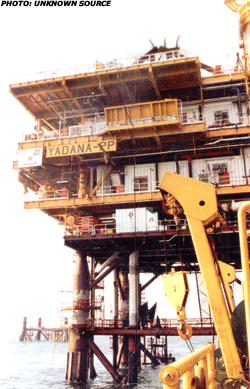The Burma-Thailand Gas Debacle
(Page 3 of 7)
The small British oil firm Premier purchased the exploration lease for blocks M-13 and M-14 in 1990 east and south of Tavoy, Tenasserim Division. In 1992 it bought the adjacent M-12 lease, then announced the discovery of the Yetagun field in M-13.
Premier was too small to take on a project like Yetagun by itself. It farmed in American oil giant Texaco (now ChevronTexaco) as the biggest shareholder and operator. Nippon Oil and PTTEP bought stakes. In October 1996 a GSA was signed with PTT with commercial production due to start in July 2000 at 200MMcf/d. MOGE exercised its option for a 15 percent stake on credit. Then things in the gas world started to get messy.
Boycott Movement Kicks In
The Yadana consortium hired the Burma Army to clear a path for the overland portion of its gas pipeline to
 |
|
...so that Thailand could buy overpriced gas from here ... |
In order to avoid a growing consumer boycott movement in the
Yadana was going to have a significant impact on Unocal’s bottom-line. A comparatively small player in the oil business, it currently has a market capitalization of only $11 billion. ChevronTexaco, on the other hand, is one of the world’s largest companies with a market cap of $115 billion.
« previous 1 | 2 | 3 | 4 | 5 | 6 | 7 next page »
